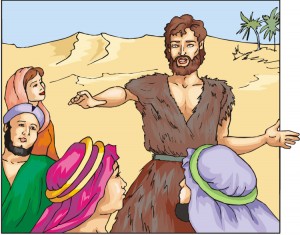Luke 3:7–17, Then he said to the multitudes. What’s really going on in this exchange between John and the religious folks of his day? Let’s step back and look at the bigger picture.
Multitudes had made the long, hot and arduous journey down through the Judean mountains to the Jordan River, which was the lowest spot on earth, to hear John the Baptist who was the latest fad preacher to come on the scene. However, when they arrived at his lonely wilderness pulpit, instead of stroking their egos by complimenting them for their religious zeal, he excoriates them and calls them a brood of vipers and tells them if they don’t repent, the fires of YHVH’s judgment will consume them (John 3:7–9). John’s preaching pierces their hearts, and now laid low spiritually, they ask him what he expects them to do (John 3:10). John then preaches a message of social justice—give to the poor, be fair and honest in your business dealings, and if you’re a government worker, treat the citizens you serve with respect (John 3:11–14).
Interestingly, he doesn’t instruct these religious Jews in what many might consider to be the more weightier matters of the Torah-law. He doesn’t tell them to punctiliously start observing the 613 commandments of the Torah, and, by the way, to stop working on the Sabbath, stop eating pork, to toss their Christmas tree in the dumpster, grow a beard, put on a tassel and head-covering, and to say “Yeshua” instead of “Jesus.” He’s basically telling them to go back to the basics—something they either never learned to do or they forgot along the way. He’s really saying, “Just be nice to your neighbor.” Be fair, honest, loving and caring in your dealings with their fellow man. And then John points them to Yeshua the Messiah who is soon to become the new star on the Judean preaching scene (Luke 3:16–17). So be nice and follow Yeshua—the most loving Person of all.
When witnessing to people, what is our approach? Do we bang them over the head with the Torah scroll and tell them all the religious things that they need to start doing, or do we tell them simply to love one another and to follow Yeshua?
But there’s more.
These Jewish folks were highly religious—even zealots. After all, some may had hiked for several days, on foot, for example, from the heights of Jerusalem descending more than 4,000 feet in elevation through the barren desert mountains of the Judean wilderness to hear John preach. Now that’s zeal! Nowadays, if we can’t get to the meeting house in ten minutes in our air-conditioned automobile, and have nice cushioned chairs to sit in once we get there, “Forget it Mildred, I’m staying home!” This multitude of Jews not only had go down to the Jordan River, and that was bad enough, but they then had to make the climb back up to Jerusalem afterwards. Oy vey!
What is the bottom line here? Why did John rebuke them, and then instruct them as he did?
These multitudes of Jews were religious zealots, to be sure, but that’s the problem—they were caught up in religiosity. After all, they were Abraham’s children. They had it made. And since they were Elohim’s chosen people, they wanted to make certain that their ticket for escaping Elohim’s judgments was punched. (Sounds like some I know in the pre-trib rapture crowd!) That’s why John rebuked them. Their hearts were evil and were far from Elohim (remember Matt 15:8?), and because of this, they were sure to incur the wrath of Elohim—unless they repented.
But repent of what, we might ask? Of not being nice people! These folks had forgotten the basics. Oh yes, they were religious, to be sure, but they were a bunch of selfish, arrogant, self-serving and self-seeking individuals who cared nothing about their fellow man—whether he was starving and naked or not, whether their business dealings were fair and just, or whether they were content in their station of life or not. Yeshua also dealt repeatedly with these same issues in his ministry—super-religious people who thought pretty highly of themselves, but who were in reality, avaricious, hypocritical and supercilious bigots. Yeshua had to rebuke even some of the early believers for the same attitude. Remember the Laodiceans (Rev 3:14–21)?
John in his epistle asks the question, “How can you say that you love Elohim whom you haven’t seen if can’t love your brother who you have seen” (1 John 4:20 cp. 1 John 3:17)?
What John the Baptist and these other scriptures are teaching us is that religiosity (religious works) isn’t an acceptable substitute for loving your fellow man. In fact, it’s totally unacceptable to Elohim. He wants us to love him by loving each other, which is the whole message of Yeshua’s Parable of the Sheep and Goats in Matthew 25:31–45.
Have you noticed that some of the meanest and uncaring people on earth are religious, even Torah-obedient, zealots? Let’s break this mean-spirited cycle. Yeshua said that his disciples would be known for their love one for another (John 13:35). Remember, love is the fulfilling of the Torah (Rom 13:8, 10).
So let’s all just start being nice to one another!


